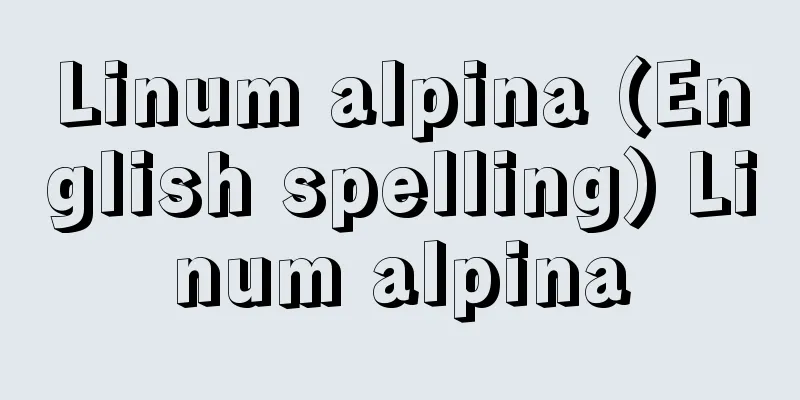Foreign Exchange and Foreign Trade Law - Gaikokukawase to gaikokubouekiho

|
Japan's basic law on international transactions. It is abbreviated as "Foreign Exchange Law". It stipulates regulations on both the foreign exchange (financial) and trade (material) aspects of international transactions. It was enacted in 1949 (Showa 24). Law No. 228 of Showa 24. It was formerly called the "Foreign Exchange and Foreign Trade Control Law", but the word "control" was deleted in the 1997 (Heisei 9) amendment (it came into effect in April 1998). When international trade shrinks, domestic industries are protected, but domestic demand is not met. On the other hand, when international trade expands, domestic demand is met, but domestic industries decline, and the risk of the import and export of embargoed goods increases. Therefore, restrictions on international trade depend heavily on the economic background, and the Foreign Exchange Law has been amended in various ways to suit the times. When the Foreign Exchange Law was enacted in 1949, Japan's economic foundation was fragile and the country was suffering from a deficit in its balance of payments. Therefore, in order to protect domestic industries, it was decided to subject exchange control to strict state control. Around the same time, the Law on Foreign Capital (Law No. 163 of 1950) was also enacted, introducing an approval system for inward direct investment. After that, Japan joined the OECD (Organization for Economic Cooperation and Development) in 1964, and coupled with rapid economic growth, there was an increasing demand from other countries for currency liberalization, and the strict exchange control of the Foreign Exchange Law no longer suited the actual situation in Japan. In response to this, the law was amended in 1980, and a new course was taken for the liberalization of exchange control and investment management. With this amendment, the Law on Foreign Capital was abolished and integrated into the Foreign Exchange Law. Later, in response to the incidents of domestic companies violating the export ban against communist countries established under the Cold War structure by exporting embargoed goods (COCOM violations), the law was amended in 1987 to require permission from the Minister of International Trade and Industry (at the time, currently the Minister of Economy, Trade and Industry) for exports of certain types of goods to areas that hinder the "maintenance of international peace and security." Informal negotiations were held between Japan and the United States from 1989 to 1990, in which further liberalization and market opening were called for (US-Japan Structural Impediments Initiative). In light of this, the 1991 amendment changed the system of ex post facto reporting for inward direct investment from the requirement of prior notification to the Minister of Finance (at the time, currently the Minister of Finance) and the minister in charge of the business. Furthermore, against the backdrop of the globalization of financial and capital transactions, further liberalization and deregulation were necessary to make the Japanese market more attractive internationally. With this in mind, the 1997 amendments undertook a fundamental review of foreign exchange controls, aiming at the complete liberalization of external transactions, centering on changing the system of foreign direct investment from a prior notification to the Minister of Finance to a post-facto reporting system. Furthermore, the word "control" in the name of the Foreign Exchange and Foreign Trade Control Law was deleted because it had a meaning similar to "control" and was therefore not appropriate for the revised law, which had made great strides in liberalization. Following the September 2001 terrorist attacks in the United States, international counterterrorism measures became an issue, and in response to this situation, the 2002 amendment introduced provisions for freezing the assets of terrorists and other parties in foreign exchange transactions. After that, provisions continued to be developed to maintain the peace and security of Japan, and the 2004 amendment introduced provisions to regulate payments, capital transactions, service transactions, and import and export transactions of goods, based on a cabinet decision. Furthermore, from the perspective of national security, in addition to the previously regulated "inward direct investment, etc.", which is when a foreign investor purchases stocks from a Japanese resident, the 2017 amendment introduced a new category of "specified acquisition" for when a foreign investor acquires stocks of a domestic unlisted company from another foreign investor, and introduced provisions that allow for the issuance of measures such as an order to sell stocks to foreign investors who have made inward direct investment, etc. or specified acquisitions without notification if there is a risk of undermining national security. Furthermore, the November 2019 amendment introduced a provision exempting portfolio investments (investments without the intention of participating in the management of a company) from the requirement of prior notification. In this way, legal amendments in response to domestic and international circumstances are expected to continue in the future. [Norihiro Takeda April 17, 2020] "International Trade Law" by Hiroshi Sano, 4th edition (2014, Yuhikaku)" ▽ "International Economic Law" by Mitsuo Matsushita and Mitsui Yonetani, 2015, University of Tokyo Press" ▽ "New Edition of International Trade Law" by Akira Takakuwa, 2019, Toshindo" ▽ "International Economic Law" by Junji Nakagawa, Akio Shimizu, Satoru Taira and Isamu Mamiya, 3rd edition (2019, Yuhikaku)" ▽ "Detailed Explanation of the Act on Prevention of Transfer of Criminal Proceeds and the Foreign Exchange Act, 4th edition (2019, Chuokeizai-sha)" [Reference] | | |Source: Shogakukan Encyclopedia Nipponica About Encyclopedia Nipponica Information | Legend |
|
日本の国際取引に関する基本法。略称は「外為法(がいためほう)」。国際取引に対して為替(金融)の側面と貿易(物)の側面の両方からの規律を定めている。1949年(昭和24)制定。昭和24年法律第228号。かつては「外国為替及び外国貿易管理法」と称していたが、1997年(平成9)改正により「管理」の語が削除された(施行は1998年4月)。 国際取引が縮小すると国内産業は保護されるが、国内需要は満たされない。他方、国際取引が拡大すると国内需要は満たされるが、国内産業は衰退し、さらに禁輸品の輸出入のおそれが増大する。それゆえ、国際取引に対する規制はその経済的背景事情に多く依存し、外為法も時代背景に応じてさまざまな改正がなされてきた。 外為法が制定された1949年当時は、日本は経済基盤が脆弱(ぜいじゃく)であり、国際収支は赤字に悩んでいた。そこで国内産業を保護するため、為替管理を厳重な国家管理に服させることとした。同時期に「外資に関する法律」(昭和25年法律第163号)も制定され、対内直接投資に認可制度を導入した。その後日本は1964年にOECD(経済協力開発機構)へ加盟し、高度経済成長も相まって、諸外国からの為替自由化の要請が高まるなど、外為法の厳重な為替管理が日本の実情にあわなくなってきた。それを踏まえてなされたのが1980年改正であり、為替管理および投資管理の自由化に舵(かじ)をきったのである。同改正により「外資に関する法律」は廃止され、外為法に統合された。 その後、冷戦構造下において設けられていた対共産圏輸出禁止措置に国内企業が違反して禁輸品の輸出を行った事件(ココム違反事件)が発生したことを踏まえ、1987年には、「国際的な平和及び安全の維持」を妨げる地域への特定の種類の貨物の輸出については、通商産業大臣(当時。現在は経済産業大臣)の許可を必要とするとの法改正がなされた。1989年から1990年にかけて日米において非公式折衝がもたれ、そこではよりいっそうの自由化・市場開放が求められた(日米構造問題協議)。これを踏まえ、1991年改正により、対内直接投資について、大蔵大臣(当時。現在は財務大臣、以下同様)および事業所管大臣への事前届出が必要であったところを、事後報告制に改めた。さらに、金融・資本取引のグローバル化を背景に、日本の市場を国際的に魅力あるものとするためには、よりいっそうの自由化・規制緩和が必要であった。それを視野に入れてなされた1997年改正では、外国為替管理の抜本的見直しがなされ、対外直接投資について大蔵大臣への事前届出制から事後報告制へと改めたことを中心に、対外取引の完全な自由化が目ざされた。また、「外国為替及び外国貿易管理法」という名称の「管理」という語は、「統制」に近い意味を有することから、自由化が進んだ改正法にはそぐわないとの理由により削除された。 2001年(平成13)9月のアメリカ同時多発テロ発生を機に、国際的テロ対策が課題となり、このような状況を踏まえ、2002年改正では、外国為替取引においてテロリスト等の資産凍結を実施するための規定が導入された。その後も、日本の平和・安全の維持のために規定の整備が続き、2004年改正では、閣議決定に基づき、支払い、資本取引、役務取引、貨物の輸出入取引などにつき規制を加える規定が導入された。さらに、国家安全保障の観点から、以前より規制対象であった、日本の居住者から外国投資家が株式を購入する場合である「対内直接投資等」のみならず、2017年改正では、外国投資家が他の外国投資家から国内の非上場の会社の株式を取得した場合につき「特定取得」という類型を新たに設け、無届けで対内直接投資等または特定取得を行った外国投資家等に対し、国の安全を損なうおそれがある場合には、株式の売却命令等の措置命令を行うことができる規定が導入された。また、2019年(令和1)11月改正では、対内直接投資のうちポートフォリオ投資(会社経営に参加する意図がない投資)については、事前届出を免除するとの規定が導入された。このように、国内外の状況に応じた法改正は今後も続いていくものと思われる。 [武田典浩 2020年4月17日] 『佐野寛著『国際取引法』第4版(2014・有斐閣)』▽『松下満雄・米谷三以著『国際経済法』(2015・東京大学出版会)』▽『高桑昭著『新版 国際商取引法』(2019・東信堂)』▽『中川淳司・清水章雄・平覚・間宮勇著『国際経済法』第3版(2019・有斐閣)』▽『中崎隆著『詳説 犯罪収益移転防止法・外為法』第4版(2019・中央経済社)』 [参照項目] | | |出典 小学館 日本大百科全書(ニッポニカ)日本大百科全書(ニッポニカ)について 情報 | 凡例 |
<<: Foreign exchange bank - gaikoku kawase ginkou
>>: Foreign exchange - Gaikoku kawase (English spelling) foreign exchange
Recommend
Hardy, Thomas
Born: June 2, 1840, Upper Bochampton, Dorsetshire ...
Pernet-Ducher, J.
...This rose had the year-round flowering charact...
Mule deer
It is a mammal of the order Artiodactyla and the ...
Ütükän yïš (mountain) (English spelling)
The ancient name of a mountain in the southeastern...
Lotzer, S.
…Among these peasant groups, the idea of “Divin...
Church
…The church as a phenomenon is extremely multidim...
Mr. Iino
...A manor that occupied the northern part of Iwa...
Bernard Forest de Bélidor
1693‐1761 French soldier and civil engineer. A for...
Ooba
〘Noun〙 A type of bird feather. It accounts for the...
Shunjo
A monk who strictly adhered to the precepts from ...
Awaji Province - Awaji no Kuni
The old name of Awaji Island, Hyogo Prefecture. I...
Koshitsu - Ancient History
A history book written by Arai Hakuseki. It was w...
Interstitial hydride
...Because of this, the melting and boiling point...
Aristippos - Aristippus (English spelling)
An ancient Greek hedonistic philosopher. Born in ...
Skill test - Ginoukentei
A system for testing and certifying the level of s...






![Kochihira [town] - Kochinda](/upload/images/67cb962b06a73.webp)


